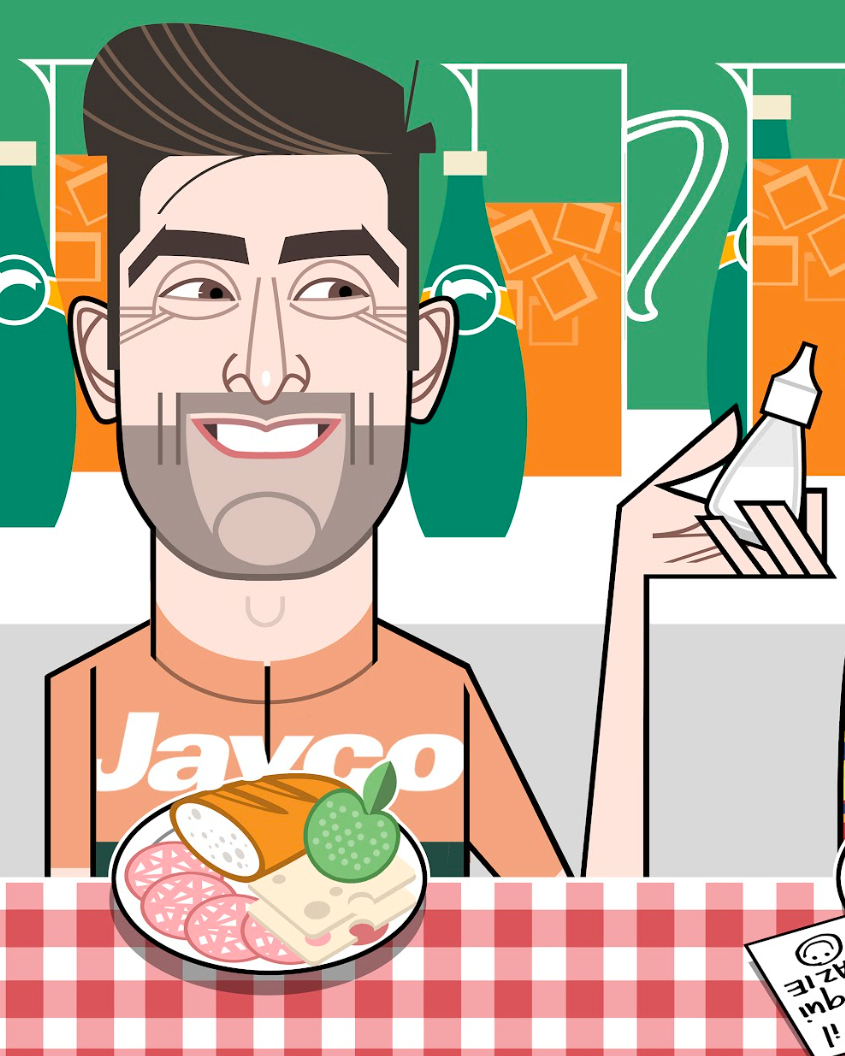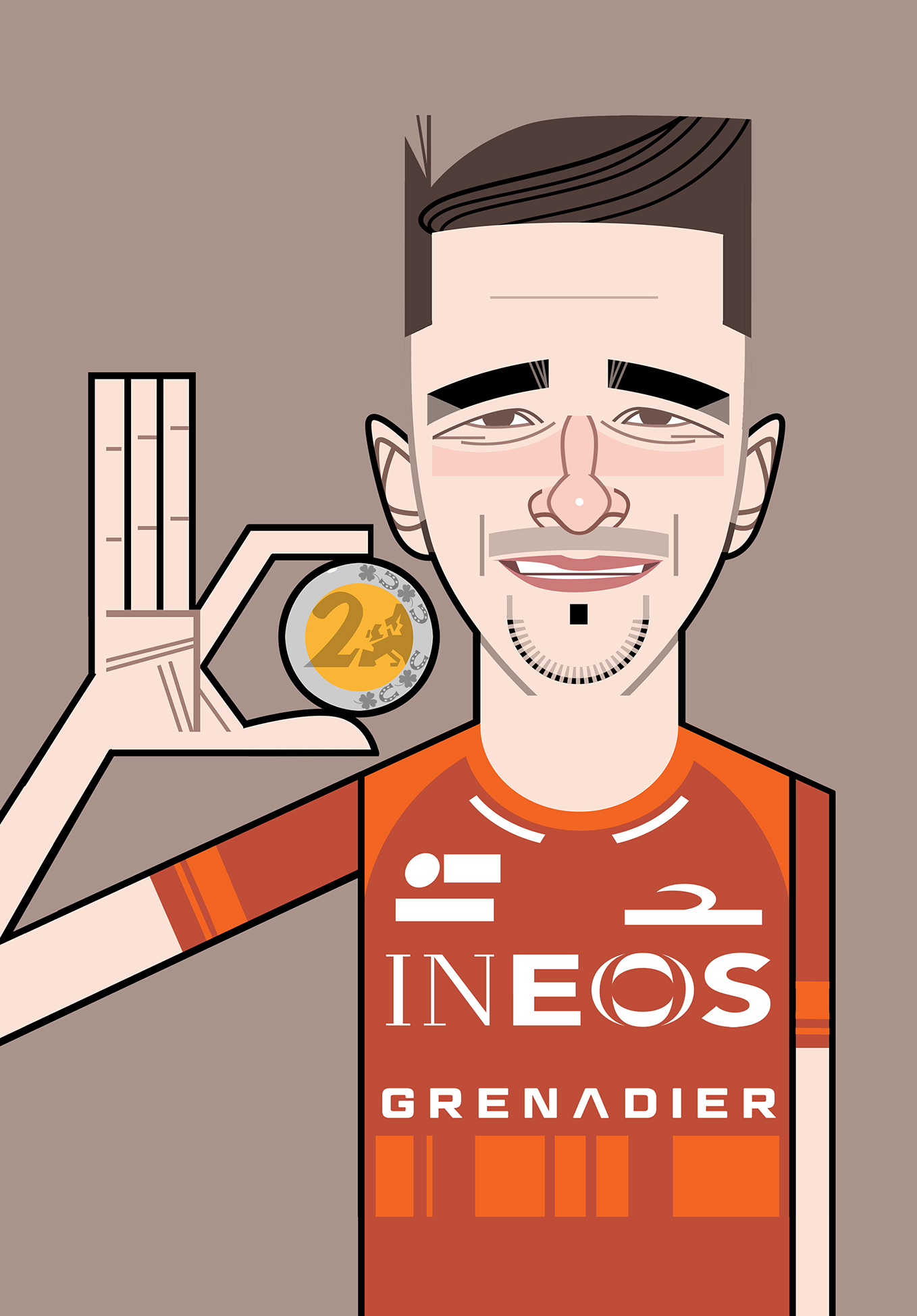'You can't pass the salt': Exploring professional cyclists' extraordinary superstitions and good luck charms
Tom Thewlis delves into the superstitions of the Tour de France peloton and tries to find out why riders adhere to them


The latest race content, interviews, features, reviews and expert buying guides, direct to your inbox!
You are now subscribed
Your newsletter sign-up was successful
If you ever find yourself sitting around a dinner table with a group of Italian professional riders, whatever you do, make sure you pass the salt correctly when asked for it.
"It’s an Italian thing," Jayco-Alula’s Luke Durbridge tells Cycling Weekly in Saint- Jean-de-Maurienne before stage five of this year’s Tour de France. The bizarre culinary superstition is, he says, important in any team where there is an Italian influence. "You can’t pass the salt to any of the Italian riders at dinner, you have to put it [down] on the table," Durbridge continues. "So you pick up the salt, lean over, and put it on the table next to the person. If you pass it hand to hand it’s really bad luck, and they get very upset if you get it wrong."
They also follow the common superstition if the salt is spilled. "If you knock it over then you have to shake the salt in your hand and throw it over each shoulder. I didn’t believe in it until a couple of years back."
Durbridge, a fairly typical down-to-earth Aussie, has reason to follow said superstitions. "I once knocked over the salt the night before the E3 Classic," he reveals. "The next day we had two broken collarbones, a concussion, and seven punctures as well. We thought, well, you know, we're just going to have to continue the Italian tradition. Most of our staff are Italian so they wouldn’t dare get it wrong."
Sparked by Durbridge's tale, we asked around the mixed zones and team buses during the first week of the Tour and discovered that bike riders’ superstitions, particularly among the Italian contingent in the peloton, extend far beyond the condiments at the dinner table.
You shall not pass

"We are really, really strange with our superstitions," Lidl-Trek’s Giulio Ciccone explains when we catch up with him in Macon. "I believe, for example, that when black cats pass in front of me when I am riding, I need to stop. I need to wait for someone to pass before me to take the bad luck, all these stupid little things.
"I also feel that I need to race with salt in my pocket every day," he adds, revealing that Italians don’t keep the salt sorcery to the dinner table. "I keep three grains grains in my pocket, the big grains."
The latest race content, interviews, features, reviews and expert buying guides, direct to your inbox!
We ask if he can show us and his manner instantly changes, a serious expression spreading across his face. "No way," he says. "I don’t want to lose it."
But what does it all really mean? Do the likes of Ciccone really believe that if you pass the salt incorrectly, bad luck will ensue?
The more we ask around, the more tales we hear of riders suffering bad luck after not following a superstition.
"I know that Mitch Docker started to believe in its powers [back in] 2018 or 2019, after he was joking around with the salt the night before Ghent-Wevelgem," says EF Education-EasyPost’s Alberto Bettiol.
"I said to him, 'You have to put the salt on the table, and then you can take it. You cannot pass it.' But he didn’t believe it. Then the day after, he crashed alone and we were saying to him on the radio, 'Look, now you have to believe it.'"
Bettiol adds: "I don’t know where it is coming from but it’s part of our culture, I guess. Even with my team mates now, I’m angry if I see somebody pass the salt directly without putting it on the table. It’s something that I really believe can affect you. 'It doesn’t cost you any extra energy, so let’s all try to do it,' I tell them."
As Bettiol and Durbridge’s anecdotes describe, superstitions can hinge on the smallest, most mundane of activities; ones with little thought process and no actual consequences, yet they still seem significant to an individual.
Listening to the Tuscan speak, I begin to think about how a friend of mine wears his watch with the face on the inside of his wrist, and my French uncle who discreetly marks a cross on a baguette before cutting into it.
When asking both of them about why they choose to do the things they do, they shrug their shoulders, and are unable to explain their actions. They have, however, admitted that to stop their quirks would be unlucky; the same applies to the Italian national champion and his colleagues in the peloton.
Bettiol tells me that he understands that his superstitions will seem unusual, and that he knows nothing would happen if he didn’t do them. Nevertheless, he is tied into an ingrained cycle which can be difficult to break, as sports psychologist Dr Josephine Perry explains.

Durbridge started to believe the Italian superstition after a bad crash
Routines or superstitions?
You won’t be surprised to hear that Alberto Bettiol has a lucky charm, hidden under his saddle.
"I have a painted red stripe," he explains. "I have had it ever since I started to cycle when I was younger. I think I have had it maybe since I was five now, I don’t ever race without it."
Dr Perry warns that an over reliance on lucky charms can be detrimental, for professionals, amateur racers and hobbyists. She explains that gradually breaking the ritualistic cycle will ultimately improve your riding in the long run and says the time is better spent on the finer details that are actually within your control.
"Over time, what’s helpful is to move superstitions and rituals towards routines," she explains. "Routines can be helpful to you. The reason we have superstitions is because we want to feel more in control of a situation we don’t feel in control of. So a routine does help us, and we can do something positive about it with a routine.
"To have a really strong, clear preparation routine in training is much more powerful for getting you to perform well in a race, because it means you won’t have forgotten anything important. You’ve left yourself enough time for everything and you become increasingly confident that you’ve done the things you need to do beforehand."
"You don't want to risk not doing it"
"These are what I call 'must' types of superstition," she says when we describe these behaviours. "They’re the ones that you did it once, you had a great race, and now you attach doing that thing to being successful."
She adds: "You do not want to risk not doing it, because it’s usually such a small thing. It’s worth doing it just in case it helps you be more successful, even though you know that there is absolutely no logic to it at all."
I ask Perry whether she believes superstitions are on the rise within the peloton, a new fad fuelled by social media and the modern age. I cite the even more bizarre behaviour of Uno-X Mobility’s Magnus Cort as an example.
By all accounts the Dane now listens to German industrial rock while 'helicoptering' certain body parts in the shower, having done it after a previous Tour stage win.
Perry explains that the whole concept is nothing new, and likens superstitions and rituals to any other habit that develops over time.
"There’s quite a famous one actually," Perry says. "Laura Kenny, when she was doing something like a European Championship as a junior, she got a wet sock when she was getting changed. She had no time to change her sock, she had to jump straight on the bike, and then she ended up winning the race.
"From then on Laura always stood on a damp towel before she put her cycling shoes on. There’s lots of other little examples like that."
I mention my uncle’s bread-cutting superstition to Bettiol as we perch on the bonnet of a team car before a stage. He throws his head back and laughs. It turns out he has a bread-related superstition too, he tells me with a grin.
"I don’t like it when I see a loaf of bread upside down on the dinner table," he says. "I also don’t like it if we are on a table for dinner with 13 people sitting around, I don’t like it and I prefer to sit apart to eat my dinner.
"I am a little crazy maybe, but all of these things don’t hurt anybody so I just try to do it."

Pidcock cleaned up at the Amstel Gold Race after his Euro windfall
Lucky charms
Away from riders’ superstitions and pre-race rituals, I discover that a handful of riders have a variety of lucky charms and objects that they include in their luggage when heading to a race.
Many of them didn’t want to share them with me, fearful of ridicule. Luke Durbridge, however, had no qualms about divulging details of his former lucky charm.
"I had a piece of wood in my helmet at the Tour years back," Durbridge reveals. "I sort of got over that though. I just lost it, I think, in the end. I had it as something from home and then it just went missing one day after a stage. I heard Tom Boonen had something similar, like a piece of wood, too."
A few weeks before travelling to Florence for the Grand Départ, we learned that Tom Pidcock had found a coin just before winning April’s Amstel Gold race. "I don’t know if it’s going to become a lucky item or not, but I found a two-euro coin on the floor of the hotel just before I won Amstel," Pidcock previously told me.
"I remember I picked it up and said, 'This is my lucky coin,' and then I went and won at Amstel. So maybe that could become a lucky thing. I don’t know where it is though, I need to find it first."

After previously working in higher education, Tom joined Cycling Weekly in 2022 and hasn't looked back. He's been covering professional cycling ever since; reporting on the ground from some of the sport's biggest races and events, including the Tour de France, Paris-Roubaix and the World Championships. His earliest memory of a bike race is watching the Tour on holiday in the early 2000's in the south of France - he even made it on to the podium in Pau afterwards. His favourite place that cycling has taken him is Montréal in Canada.